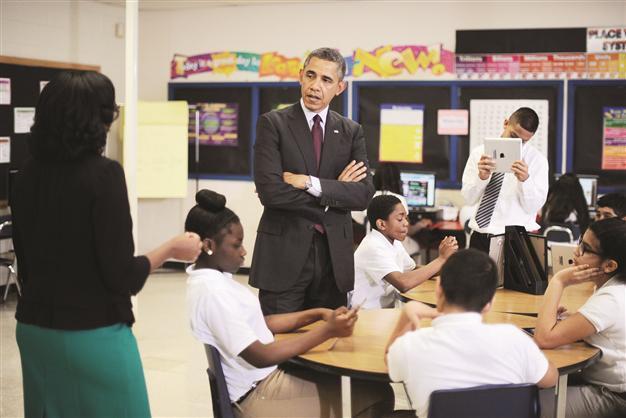Education’s future for the innovation

US President Obama has been warned that test system is killing creativity.
One of the most promoted statements, particularly now in the time of economic crisis, is economic development and growth can be reached by innovation.There is consent about the fact that “innovation can only flourish in a culture that recognizes and rewards new ideas and gives authority to translate these ideas into practice.” Almost everybody states unlocking creativity is essential to economic growth.
New research reveals a global creativity gap in five of the world’s largest economies the U.S., U.K., Germany, France and Japan. There is overall concern that creativity is suffering at work and at school. More than half of those surveyed feel creativity is being stiffed by their educational system, and many believe creativity is taken for granted (52% globally, 70% in the U.S.).
One of the myths of creativity is very few people are really creative. The truth is everyone has great capacities, but not everyone develops them. And it all starts in kindergarten and in elementary school. In far, most of the systems the accent is on standard methods, discipline and collective behavior. Skills are rewarded, but not imagination and creativity. You are a candidate even for artistic education on the basis of your skills not on the basis of your creativity or imagination.

Prof. Danica Purg, Dean and
President of IEDC-Bled
School of Management, Slovenia
Economists perhaps understand this play more than some others. Gradgrind forbids all imagination and recreation. These ideas are rooted in the utilitarian educational philosophy of the 19th century. The new wave of standardization and testing find its roots in what I call the neo-utilitarianism of our times.
Don’t we need standards of quality? Of course we do. But they may not get the function of a box all children are disappearing in.
We have to develop methods and conditions in the learning process that leads to reach the quality standards on a creative and engaging way (for example, student practice, instead of demonstrating, praise original ideas and work, ask open questions instead of suggestions, problem solving methods instead of answers etc.) And does it become better in High School Education? The overall picture is creativity has got this place only in classes of art and music. And in fact, it is the question, how much creativity and imagination we see there. Also here, as I suggested before, selection is done mainly on the basic skills. And so we finally end up inside the box. From that we can understand better the expression “out-of-the-box-thinking” and the grand efforts we have to make to do so, we have been living in the box for far too long.
Of course, for a longer time, this development has been justified by the Taylorist, Fordist and ideas of scientific management paradigm. We spoke about “managing the classroom” and “managing” work.
The accent has been on execution on the basis of the standardized methods and fixed times. One time we felt employees could have good ideas on improvisation and innovation. We discovered the suggestion box. Again a box instead of hanging the proposal on public clipboards for open information and discussion. Of course, the box could be only by management, also to become the owner, sometimes with rewarding of suggestion. New technological and paradigms contain notions of leadership based on vision, inspiration and motivation, based on initiative, risk-taking and grasping opportunities.
At IEDC, we are making efforts to develop leaders who are using their senses, daring to learn on their imagination and intuition. The problems they face are too complex to manage out of the box. At IEDC-Bled School of Management, we are using art to develop new leaders. One of the activities is to discover your leadership style through the metaphor of art styles. It is not surprising the outcome before the crisis has been that many executives answered they are basically “romantic” leaders, cherishing imagination, but the organization and the job just makes them “realists” and now during the crisis, they just describe themselves as “realists.” It is clear the future educational system and the content has to change drastically, for only with “realists,” we shall not succeed to reach growth through innovation.
This is the speech by Prof. Danica Purg at the 17th Eurasian Economic Summit.
















